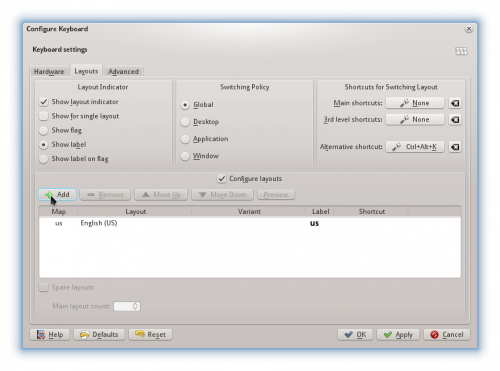KTouch/HowTo/DifferentKeyboardLayout/en: Difference between revisions
Updating to match new version of source page |
Updating to match new version of source page |
||
| Line 3: | Line 3: | ||
==How to train on a different keyboard layout or language== | ==How to train on a different keyboard layout or language== | ||
KTouch narrows down the course selection to match the active keyboard layout. For example if you are using the US keyboard layout only the courses created for this layout are visible. So if you want to train another keyboard layout or language the first you want to do is to set up your keyboard. | '''KTouch''' narrows down the course selection to match the active keyboard layout. For example if you are using the US keyboard layout only the courses created for this layout are visible. So if you want to train another keyboard layout or language the first you want to do is to set up your keyboard. | ||
To do so KTouch offers a shortcut to the relevant system settings module. Select | To do so '''KTouch''' offers a shortcut to the relevant system settings module. Select <menuchoice>Configure Keyboard</menuchoice> in the application menu. | ||
[[Image:KTouchMenuConfigureKeyboard.png|center|thumb|500px]] | [[Image:KTouchMenuConfigureKeyboard.png|center|thumb|500px]] | ||
Use the settings in the | Use the settings in the <menuchoice>Layouts</menuchoice> tab of the following dialog to add a new layout for the desired language or keyboard. You should also tick <menuchoice>Show layout indicator</menuchoice> to have a convenient way to switch between the configured layouts. If selected, there will be new entry in system tray for this. | ||
[[Image:KTouchConfigureKeyboardDialog.png|center|thumb|500px]] | [[Image:KTouchConfigureKeyboardDialog.png|center|thumb|500px]] | ||
| Line 15: | Line 15: | ||
With these steps done you are ready to train on the new keyboard layout. Just make sure to select the correct layout when you want to train touch typing. | With these steps done you are ready to train on the new keyboard layout. Just make sure to select the correct layout when you want to train touch typing. | ||
===KTouch on GNOME or other desktop environments=== | === KTouch on GNOME or other desktop environments === | ||
The steps above only apply for users of the '''KDE Plasma Workspaces'''. KTouch will still be able to detect the active keyboard layout, but the keyboard layout configuration utility of the desktop environment has to be used to setup the keyboard. | The steps above only apply for users of the '''KDE Plasma Workspaces'''. '''KTouch''' will still be able to detect the active keyboard layout, but the keyboard layout configuration utility of the desktop environment has to be used to setup the keyboard. | ||
'''GNOME''' users may refer to [https://help.gnome.org/users/gnome-help/stable/keyboard-layouts.html.en this guide]. | '''GNOME''' users may refer to [https://help.gnome.org/users/gnome-help/stable/keyboard-layouts.html.en this guide]. | ||
| Line 23: | Line 23: | ||
===KTouch on Microsoft Windows=== | ===KTouch on Microsoft Windows=== | ||
KTouch is unable to detect the keyboard layout on Windows. Therefore one has to manually specify the keyboard layout in the application menu after setting the desired keyboard layout in the '''Control Panel'''. | '''KTouch''' is unable to detect the keyboard layout on Windows. Therefore one has to manually specify the keyboard layout in the application menu after setting the desired keyboard layout in the '''Control Panel'''. | ||
[[Category:Tutorials]] | [[Category:Tutorials]] | ||
Latest revision as of 06:19, 29 January 2015
How to train on a different keyboard layout or language
KTouch narrows down the course selection to match the active keyboard layout. For example if you are using the US keyboard layout only the courses created for this layout are visible. So if you want to train another keyboard layout or language the first you want to do is to set up your keyboard.
To do so KTouch offers a shortcut to the relevant system settings module. Select in the application menu.

Use the settings in the tab of the following dialog to add a new layout for the desired language or keyboard. You should also tick to have a convenient way to switch between the configured layouts. If selected, there will be new entry in system tray for this.

With these steps done you are ready to train on the new keyboard layout. Just make sure to select the correct layout when you want to train touch typing.
KTouch on GNOME or other desktop environments
The steps above only apply for users of the KDE Plasma Workspaces. KTouch will still be able to detect the active keyboard layout, but the keyboard layout configuration utility of the desktop environment has to be used to setup the keyboard.
GNOME users may refer to this guide.
KTouch on Microsoft Windows
KTouch is unable to detect the keyboard layout on Windows. Therefore one has to manually specify the keyboard layout in the application menu after setting the desired keyboard layout in the Control Panel.
